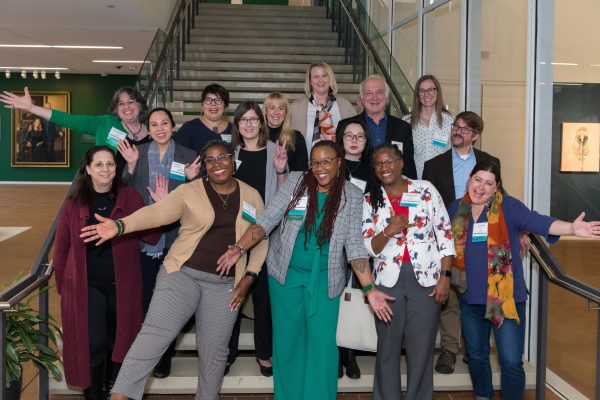Takeways from Schul 2024

By: Asha Ellison
You may speak to someone in passing; maybe share a greeting while purchasing a cup of coffee or have a brief exchange while checking out at the grocery store. You may even share a ride on the Light Rail, attend the same religious retreat with your respective churches, cheer together in the supporters section at a Charlotte FC match, or approach a public art installation in Uptown with the same curiosity, but when was the last time you made a genuine connection with someone different from you – in race, culture, class, neighborhood of residence, occupation or education?
On February 1, 2024, the UNC Charlotte Urban Institute hosted its fourth Schul Forum, an annual convention that creates space for learning, dialogue, and the generation of actionable ideas to find solutions to important issues that matter to the Charlotte region. This year, leaders of the institute asked local and national voices, as well as engaged members of the community, to consider the following question: Could life in the Charlotte region be more prosperous through cross-class connections? Recent research by the Opportunity Insight team, led by Harvard researcher and professor Dr. Raj Chetty, suggests that relationships across differences in shared spaces, also known as economic connectedness, could lead to positive economic outcomes. [Watch a recap of Dr. Raj Chetty at the 2023 Chancellor’s Speaker Series, courtesy of WFAE, here.]
But for who? And, how?
Attendees of this year’s Forum found that there were no easy answers to those questions. In concurrent breakout sessions, before reconvening for a keynote panel discussion on “Our Connecting Spaces” in the auditorium at The Dubois Center at UNC Charlotte City Center, participants discussed their beliefs that the concept of economic connectedness itself is nuanced and complex.
While there is no denying that we are molded by our neighborhoods, schools, houses of worship, and the places where we work, play, and create, the relationships and networks we build in those spaces take time and effort to cultivate – especially as people who are homogenous by nature. Even friending bias tells us that we are most inclined to build connections with those most similar to us. So, how do we build connections that truly create fulfilling and prosperous outcomes for all?
Forum attendees had the opportunity to engage with local and national experts on designated connecting spaces including arts and culture, communities of faith, mixed-income communities, and the education continuum. There, they were able to collectively discuss the challenges of connecting across differences, as well as participate in solution-focused dialogue. From there, attendees enjoyed snacks and a poster session where the research of honored Gambrell Faculty Fellows was featured for review and discussion.
The Forum concluded with a keynote panel discussion featuring Dr. Valerie Cooper of Duke Divinity School, Megan Gallagher of the Urban Institute (Washington D.C.), Dr. Mark Joseph of Case Western Reserve University, and Usha Srinivasan of Mosaic America. The panel, in addition to answering audience questions and those facilitated by moderator, Dr. Byron White, provided collective expertise across the connection spaces respective to the event.
A reception honoring the Gambrell Faculty Fellows immediately followed the panel and concluded the 2024 Forum.
View photos from and videos from the event via the galleries linked below:
[ 2024 Schul Forum Photo Gallery 1]
[ 2024 Schul Forum Photo Gallery 2]
[2024 Schul Forum Recap Video]